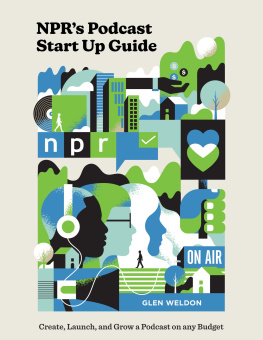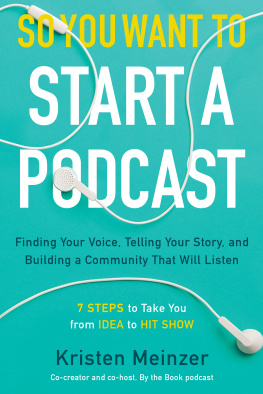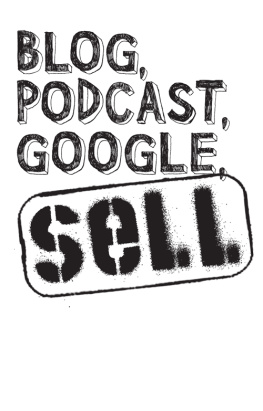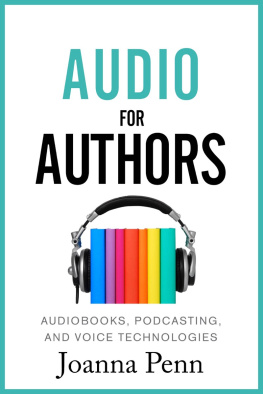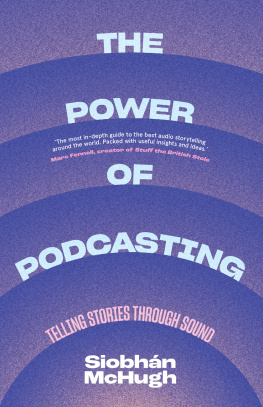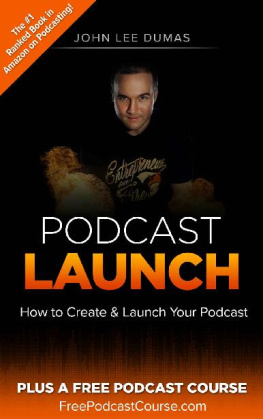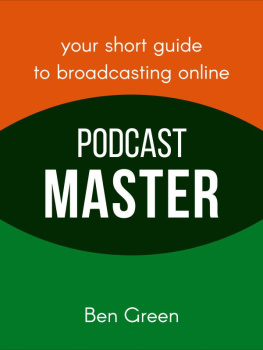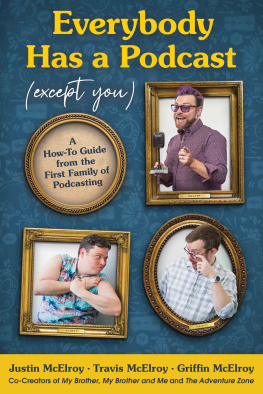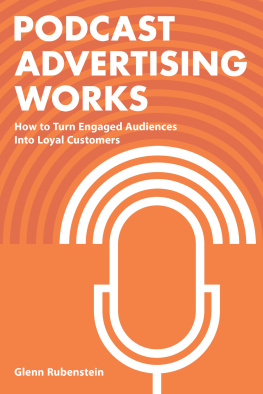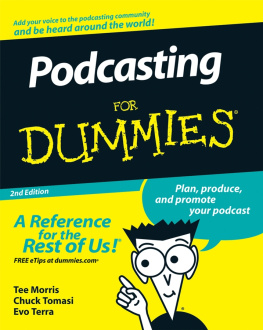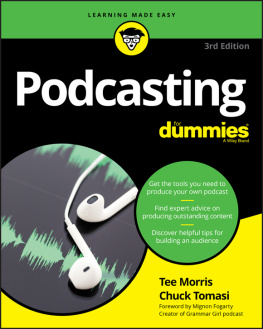Contents
Landmarks
Print Page List
Acknowledgments
Thanks to agents Jane von Mehren and Lauren Sharp at Aevitas, to Matt Inman and the team at Ten Speed Press, and to everyone at NPR who helped bring this book into being, including but not limited to Anya Grundmann, Kristen Hartmann, Michael Lutzky, Neal Carruth, Ashley Messenger, Micah Ratner, Luke Medina, Daniel McCoy, Argin Hutchins, Kasia Podbielski, Keith Woods and Mathilde Piard. Id hoped to sort of loom over the desks of my NPR podcasting colleagues until they gave me a nugget I could use in the book, but COVID-19 meant they instead had to endure repeated, entreating emails and phone calls. Thanks for responding, and for your invaluable input, Rund Abdelfatah, Ramtin Arablouei, Rob Byers, Jessica Deahl, Gene Demby, Nick Fountain, Cardiff de Alejo Garcia, Jessica Hansen, Linda Holmes, J. C. Howard, Kristin Hume, Mike Katzif, Danielle Kurtzleben, Susan Leland, Candice Lim, Andrew Limbong, Alison MacAdam, Kenny Malone, Kelly McEvers, Shereen Marisol Meraji, Steve Mulder, Guy Raz, Jessica Reedy, Sam Sanders, Sara Sarasohn, Yowei Shaw, Liana Simstrom, Madeline K. Sofia, Cara Tallo, Stephen Thompson, Jesse Thorn, Shankar Vedantam, Sami Yenigun and Manoush Zomorodi. Mostly, though, I need to thank my collaborating writer Toni Sciarra Poynter, who did the heavy liftingpulling together sources, wrassling the outline into shape, beating the manuscript into submission. I often felt like I was watching someone deftly change a tire while standing a few feet away, holding the lug nuts in a hubcap. Tonis a star.
CONCLUSION
Five Rules to Podcast By
I fell in love this week.
Happens a lot.
My husbands cool with it. We have an understanding. Also: The object of my love is a podcast.
Probably should have mentioned that at the top.
What its about doesnt matter. I mean, it does. But Im driving at something else. Something that, maybe, has happened to you, too.
I did what I always do with a new podcast paramour: I binged. Tore through the archive, episode after episode. Its all Ive listened to for a solid week: working out, walking the dog, folding socks, loading the dishwasher, realizing Id loaded the dishwasher with folded socks, unloading the dishwasher, you get the idea.
It occurred to me, during a pause in my archival gorging, that what triggered this infatuation was exactly what had triggered all the others.
This profound adoration wasnt directed at the podcasts subject or at the hosts. No, what I love, what I hunger for, what keeps me perpetually searching for new podcasts, is what happens when the subjects and the hosts intersectthe nature of those conversations.
It creates in me an upwelling of congenial familiarity, a sense of knowing and being known.
Of friendship.
Listening to a favorite podcast engenders a powerful sense of intimacy. You come to know the hosts tastes, tics, pet topics, overused phrases, in exactly the same way that you know your friends.
Perhaps most crucially, the voices and ideas transmitted inside your head via your earbuds roost there, rubbing shoulders with your own thoughts. No wonder you feel as if you know these people.
You likely feel a sense of closeness with the authors of your favorite books, or with actors whose work youve followed or familiar radio personalities. But radio, TV, the silver screen, and the web bring experiences to you, and you let down your mental drawbridge, so to speak, to allow them in. Podcasts? They worm their way right inside your brain.
Thats the singular power of podcasts, I think.
Not so many chapters ago, your podcast idea was a dream. Weve covered a lot of ground together. I hope that reading this book has helped you pursue your quest of creating a podcast, from tending a barely-there glimmer of a concept to taking steps to make your podcast a reality.
I hope, too, that Ive gotten you thinking about what podcast creators do to trigger that enduring intimacy that draws an audience in and keeps them there. Ive narrowed it down to a handful of rules Id like to leave you with.
Be authentic. This is the toughest rule to follow. But if youre trying to hit the precise alchemical formula that will make everyone fall in love with your podcast, the best thing to do isnot to try. Listeners can sense when somethings forced, when youre playing on their emotions or calculating an effect instead of providing a story or creating organic curiosity, inquiry, interest, and passion. If listeners can hear your authenticity, theyll join in with it. (I listed this first, but its not the most important rule. Youll see why.)
Prepare. I get it. You dont want to sound flat, rehearsed, stale. But know this: Winging it is not an option, not if you care about what youre putting out there, and if you expect others to care about it, too. If theres anything this book teaches, I hope its to respect your audiences commitment of their time and ears to give them your best.
But leave room for discovery. You need to invite listeners in. You do that by bringing them along with your thought process: Listeners want to feel like theyre in the room with you. So, yes, prepare. Absolutely prepare. Map out story arcs, driving questions, signposts, phrasing. But always remember to show your work, to be open to twists in the road, to reach for insights. The goal is for all of uscreators and audience aliketo collectively find something in the story or conversation that we hadnt planned on finding when we started.
Be yourself, but better. Yeah, yeah, yeah: Be authentic, be prepared, be open to discoverythe first three are good rules. Learn them and live by them. Run your podcast by them. But the moment you start recording? Forget them. Just be there, in front of the mic, and shine. Because the version of yourself that you need to be on your podcast is, at the end of the day, a performance of yourself. Or lets say: a distillation of yourself. One thats sharper, cleaner, more efficient. Funnier, probably. Maybe even smarter. Certainly pithier. (Please, for the love of all that is holy, be pithier.) How do you go about ensuring all of that? Simple.
Edit. Edit ruthlessly. With no discernible ruth. At all. None . This is it, the most important rule. The One True Answer to Everything. Yes, podcasts need to feel naturalbut thats just it. They need to feel natural. Not be. Feel. That means editing. Using your aural scalpel to cut digressions, dead ends, jokes that dont land, andif youre willing (and oh, be willing)the ums, aahs, and lip smacks. When in doubt, take it out. Its not dishonest. It isnt slick. Its a service to your listeners. Its a way of focusing your discussion, a precious opportunity to identify and delineate what makes your podcast unique. Do not shirk this. Dont fail your podcastor your audience. Violate rules 1 through 4 if you must, but never, ever flake on rule 5.
So go now, and podcast. Podcast like the wind, if the wind were a thing with a podcast! Be brilliant, be witty, be warm (not too warm, please, guys), be brutally tough on yourself, and have fun.
If you do, so will we.
Im serious. Think the last ten minutes of Harold and Maude . That ruthless.
Glossary of Audio Production Terms
Lets say you are producing an audio story, and youre asked to dip the ambi under the track, butt cut the next two acts, and then sweep up and maintain the ambi. You got it? If that sentence was confusing, this glossary is for you. Terms for producing and mixing audio go back to the days of cutting real tape with razor blades, but most of them have lived on into the era of digital production. This glossary is largely based on Alison MacAdams Butt Cut What? A Glossary of Audio Production Terms and Definitions. While it is not intended to be exhaustive, it will add to your audio vocab and help you talk shop with geeky abandon. Enjoy!

